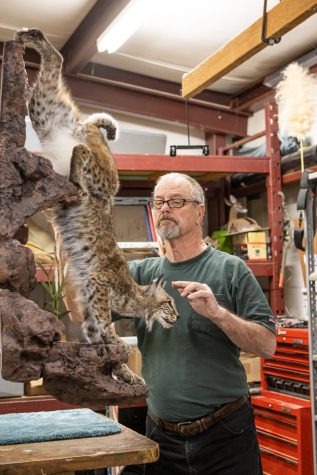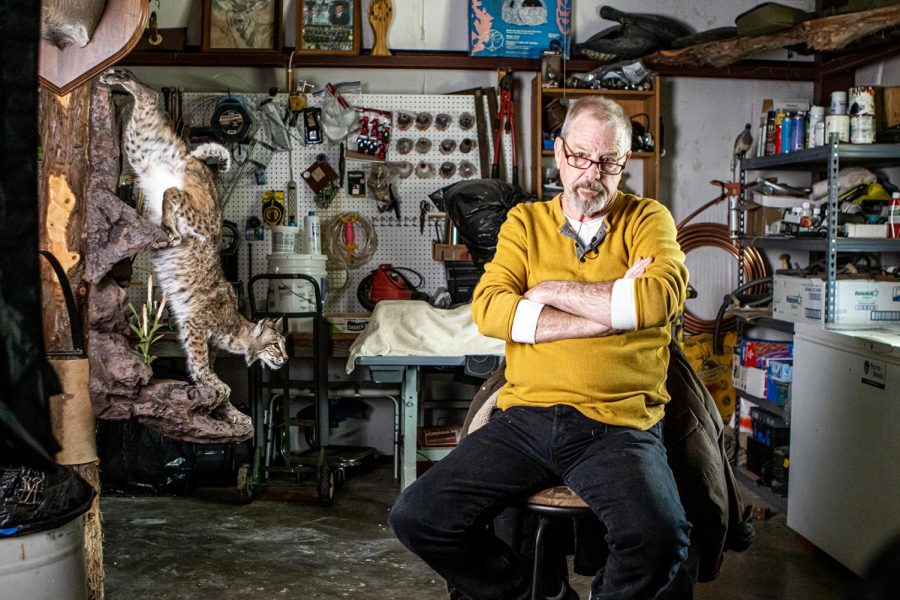Preserving the passion
Trumble pursues hobby in taxidermy
Photo by Peyton Sims
What once was solely a hobby to Donald W. Trumble has since transformed into a business that gives him a purpose behind the start of his day. Arkansas Wildlife Taxidermy is one of the most well known locations for the craft across the city.
February 11, 2021
As you turn down a desolate path in Texarkana, Arkansas, an arrow that reads “TAXIDERMIST” assures you that you’re heading in the right direction. From sunrise to sunset, a workshop remains open for business. While Donald W. Trumble runs his shop himself, he’s not alone when he arrives to work in the morning. Bobcats scale the walls, ducks take flight over head, and deer sit on their mounts. All are creations that have been brought back to life by Trumble himself.
What once was solely a hobby to Trumble has since transformed into a business that gives him a purpose behind the start of his day. Arkansas Wildlife Taxidermy is one of the most well known locations for the craft across the city. Despite the circumstances, everyone’s passion stems off of something in their life.
“It’s been a struggle from time to time, but the struggles are what made me who I am,” Trumble said. “I was born on an Indian Reservation in Oklahoma. As a child, I was like any other kid. I liked to play and get in trouble. I went to Texas High and graduated in 1969. I wasn’t raised with a cell phone. Back in those days, people used to steal watermelons instead of cars.”
When the alarm goes off at 3 a.m., he’s ready to start his day. Trumble heads straight to his workshop with his next creation in mind. However, before he jumps straight into work, he likes to set his time aside for something else.
“I go to bed at five in the afternoon, and I get up at three in the morning. When I get up, I come in here, and I read my Bible, and I think about how to start my day,” Trumble said. “The night before I start [mounting animals], I take them out of the freezer to let them thaw out overnight. I get to watch TV while I’m working, and I’m my own boss. I don’t have anybody telling me what to do, except for my wife. ”
It’s likely that if a person is inexperienced with hunting, they are unaware of their local practicing taxidermists. Throughout Texarkana, Trumble is one of the few on the job. During hunting season, the amount of orders that fill his freezer can be overwhelming, but in the end, his hard work pays off.
“I work four days a week. I leave Friday, Saturday and Sunday open for hunting, fishing and my own free time. I do a lot of coyotes, bobcats and foxes. I used to do a lot of alligators, but I don’t know anymore,” Trumble said. “It’s different for every person, but over the years, I’ve made about $35,000. This is a dying trade. For me, I try to keep it a hobby instead of a business, but it’s quickly starting to turn into a business.”
COVID-19. We’ve seen its damage, and we continue to watch it unfold. With Arkansas Wildlife Taxidermy being a small business, coronavirus affected the amount of customers Trumble was taking in at a designated time.
“COVID-19 has helped me out, believe it or not. However, I’ve been accepting orders at only 20% capacity,” Trumble said. “I have a lot of customers that are putting their animals in the freezer while they’re waiting for me to open back up fully. There’s plenty of work out there to do. You’ve just got to be devoted to it. You’ve got to do it. I don’t think it’s really a matter of intelligence. I think it’s just a matter of being challenged, and being determined in that area.”
Having such a unique occupation, Trumble has had his fair share of unique stories. While he’s encountered one-eyed animals and three-legged deer, one experience easily tops these absurdities.
“A good friend of mine brought a deer he killed up here, and we walked over to go get it out of his truck. When we got outside, the deer stood up on all fours,” Trumble said. “It was a big, old buck. He was wobbling around in the back of the man’s pick up truck. His wife was in a cab, and she got out to beat it with a cane. I really think she was trying to kill it.”

Considering what goes into preserving an animal, there’s many unsanitary repercussions. After learning this first hand, Trumble now knows to always have rubbing alcohol and other disinfectants readily available to rid off any pesky maggots and microscopic bugs.
“The insects are my biggest challenge. I’ve worked so hard to fight off the bugs and ticks. When the deer get here, they’re loaded with ticks,” Trumble said. “They’ll start crawling up my arm, and they’ll get all over my chest. They were so tiny that I had to go to the doctor for him to look [at the bugs] under the microscope. They’re almost like bed bugs. With that being said, you’ve just got to be careful and really sanitary.”
The destruction of one’s motivation has proved to heavily affect their work ethic. Instead of spending the entirety of his retirement in leisure, Trumble is determined to let no day go to waste.
“What makes me want to come back to work every day? Well, when you get up out of bed, you’re retired; you know you need to do something. You mow the grass. You fix everything in your house until you don’t have any more chores,” Trumble said. “And then you have to ask yourself, what am I going to do with the rest of my day? Am I just going to lay here and watch TV, or will I do something productive? I know I’ve got this work out here, so I get busy.”
















Randy King • Feb 13, 2021 at 6:08 am
Great article and pictures Peyton! Keep up the great work!
Rebecca Frix • Feb 12, 2021 at 7:19 pm
Great story!